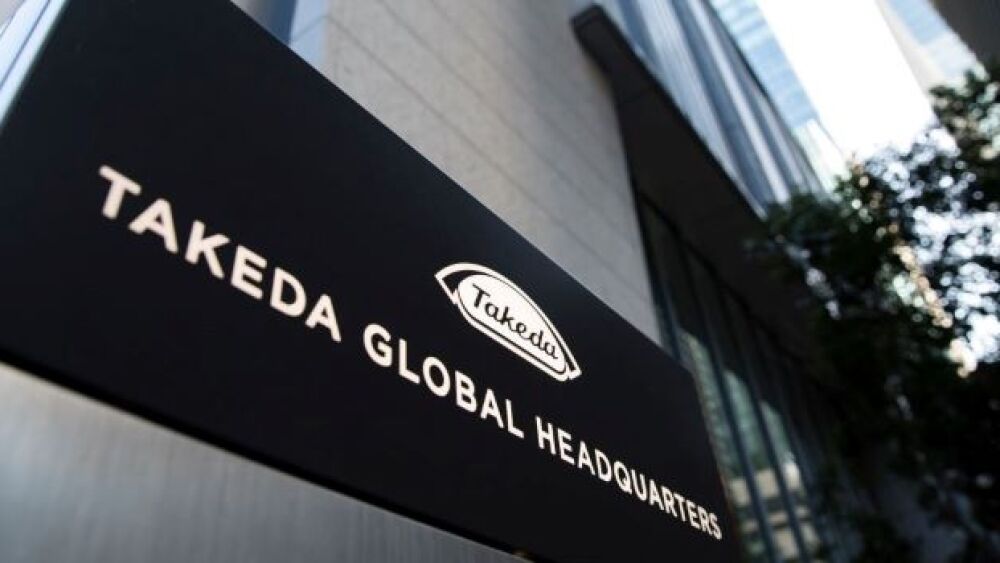Takeda will present nine abstracts at the annual ASH meeting, including data for its hemophilia program, as well as announcing a new sickle cell disease program.
Tomohiro Ohsumi/Getty Images
Takeda Pharmaceutical is flexing its hematology muscle at the American Society of Hematology meeting, showcasing its pipeline’s depth for hematological diseases, particularly its factor VIII treatment for hemophilia, Adynovate. In all, Takeda will present nine abstracts at the annual ASH meeting, including data for its hemophilia program, as well as announcing a new sickle cell disease program.
Neil Inhaber, head of Global Medical Affairs and Rare Genetics and Hematology at Takeda, said the company is aiming to deliver “potentially transformative molecules” aimed at multiple rare and life-threatening hematological disorders. At the same time, Inhaber said the company is also expanding the body of evidence to support its currently-available portfolio of treatments for bleeding disorders, such as hemophilia.
In hemophilia, Takeda will present data assessing Adynovate, an extended circulating half-life recombinant Factor VIII (rFVIII) treatment for hemophilia A, first approved by the U.S. Food and Drug Administration (FDA) in 2015, in previously untreated patients.
Takeda gained Adynovate through its $62 billion acquisition of Shire. The safety, immunogenicity, and efficacy data will include patients younger than six years old who have been diagnosed with hemophilia A, which affects about 173,000 people across the globe.
Hemophilia is a chronic disease that causes longer-than-normal bleeding due to absent or deficient clotting factor in the blood. Typical treatment required multiple infusions of factor VIII replacements for hemophilia A patients who do not have factor VIII inhibitors each week. Those frequent infusions can reduce the frequency of bleeds.
In addition to that data, Takeda will present post-hoc data from the PROPEL study, a randomized clinical trial in severe hemophilia A patients on FVIII prophylaxis. In that study, six different biomarkers of joint health were measured in 98 patients before and after prophylactic treatment with Adynovate. This novel biomarker data is the first in a randomized clinical trial to understand the importance of prophylaxis for joint health in patients with hemophilia A. Additionally, this is the first study that examines longitudinal biomarker levels in a prospective randomized study of severe hemophilia A patients who are undergoing FVIII prophylaxis at two trough levels (1-3% and 8-12%). This is done in order to examine the correlation between clinical outcomes and surrogate markers. The results also showed improvement in specific biomarker levels from baseline to study completion.
Also in hemophilia, Takeda will present real-world data that has been extracted from the IQVIA PharMetrics Plus database in order to analyze prophylaxis with factor VIII replacement and emicizumab (Genentech’s Hemlibra). Takeda said the real-world data will highlight the financial cost of switching from FVIII to emicizumab. The company believes the data will enable treatment providers to understand the best treatment options, as well as long-term implications of use in order to provide more personalized care for the patients.
Hemlibra was approved by the FDA in November 2017 as the first medication for Hemophilia A patients with factor VIII inhibitors in 20 years. In 2018, the FDA approved the drug for hemophilia A patients who do not have factor VIII inhibitors.
Takeda will also use ASH to showcase plans for other assets aimed at blood-based diseases. The company will present a Phase IIIb continuation study design that will evaluate the long-term safety and efficacy of TAK-755 as a potential prophylactic and on-demand treatment of severe congenital thrombotic thrombocytopenic purpura (cTTP). Takeda is assessing the potential of TAK-755, a recombinant ADAMTS13 replacement therapy in patients who have severe cTTP, an ultra-rare and potentially life-threatening ADAMTS13 deficiency driven thrombotic disorder. Additionally, Takeda will present the design of a Phase I study that will assess TAK-755 in patients with sickle cell disease.





